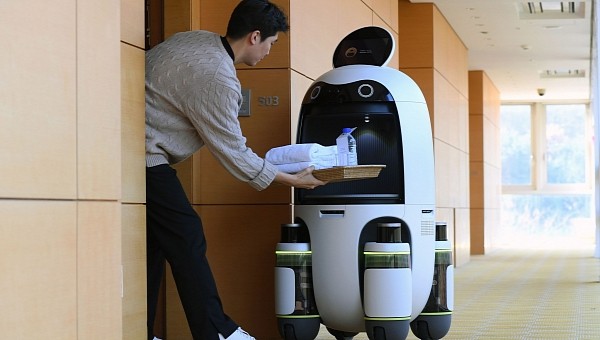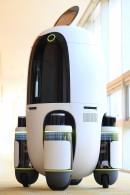Delivery robots had a mixed year in 2022, just like the rest of us. Some of them unplugged for good, while others entered the fray. Hyundai is among the companies trying to advance the concept of last-mile delivery with its Plug & Drive robots.
Autonomous delivery robots promised to revolutionize the way goods are delivered, although the real-world experience was less encouraging. Some of the more established players in the field pulled the plug on their last-mile delivery robots, including Amazon and FedEx. Nevertheless, others jumped on the bandwagon to fill the ranks, as we’ve seen Magna doing recently. Now, it’s Hyundai’s turn to expand its footprint into the autonomous delivery robots market.
In January, the Korean company presented a Plug & Drive (PnD) robotic module at CES. Unlike other delivery robots, which use big wheels to go over bumps, Hyundai’s approach relies on an interesting wheel concept. It calls it a “Drive & Lift (DnL) module” and is basically an eccentric wheel mechanism that combines the drive, steering, suspension, and braking systems into one structure. A robot equipped with these modules can lift the wheels as needed and stay leveled as it traverses uneven terrain, such as steps or speed bumps.
Almost a year later, Hyundai announced two new pilot delivery service programs based on this concept, with a PnD robot beginning service at Rolling Hills Hotel and another at a residential-commercial complex located on the outskirts of Seoul. The robots use LiDAR and camera sensors to map the surroundings and leverage autonomous driving capabilities to find the optimal route within the area to deliver packages to recipients.
The robot working at the Rolling Hills Hotel has a two-hour room service routine between 8 pm and 10 pm, delivering amenities, food, and drinks. Hotel guests can place their room service orders and follow the delivery’s progress through the highly popular (in Korea) Kakao Talk messaging app. The robot uses a deep-learning-based algorithm to recognize the surroundings, people, and actions. It’s even smart enough to know when to give up if the elevator is too crowded.
For now, Hyundai seems pretty excited about using robots for last-mile delivery. If the pilot programs prove successful, the Korean carmaker intends to expand its PnD-based delivery robot services with more robots and extended operating hours. But first, it surely needs a better name than PnD.
In January, the Korean company presented a Plug & Drive (PnD) robotic module at CES. Unlike other delivery robots, which use big wheels to go over bumps, Hyundai’s approach relies on an interesting wheel concept. It calls it a “Drive & Lift (DnL) module” and is basically an eccentric wheel mechanism that combines the drive, steering, suspension, and braking systems into one structure. A robot equipped with these modules can lift the wheels as needed and stay leveled as it traverses uneven terrain, such as steps or speed bumps.
Almost a year later, Hyundai announced two new pilot delivery service programs based on this concept, with a PnD robot beginning service at Rolling Hills Hotel and another at a residential-commercial complex located on the outskirts of Seoul. The robots use LiDAR and camera sensors to map the surroundings and leverage autonomous driving capabilities to find the optimal route within the area to deliver packages to recipients.
The robot working at the Rolling Hills Hotel has a two-hour room service routine between 8 pm and 10 pm, delivering amenities, food, and drinks. Hotel guests can place their room service orders and follow the delivery’s progress through the highly popular (in Korea) Kakao Talk messaging app. The robot uses a deep-learning-based algorithm to recognize the surroundings, people, and actions. It’s even smart enough to know when to give up if the elevator is too crowded.
For now, Hyundai seems pretty excited about using robots for last-mile delivery. If the pilot programs prove successful, the Korean carmaker intends to expand its PnD-based delivery robot services with more robots and extended operating hours. But first, it surely needs a better name than PnD.








